
Using Amazon Reviews for Competitor Analysis

Table of Contents
Data Science is Trending
A quick look at the available data scientist jobs on LinkedIn and Indeed will show you what I mean. If you’re a data scientist with an active pulse, you’re hiring material.
Maybe you’re a professional sports team manager employing data scientists to find a way to get the team’s payroll under the salary cap. Or, a traffic-flow engineer is trying to decide how long before we need to pave all of Southern California.
In either case, data is king.
When it comes to e-commerce and selling on Amazon, there are many different data streams, but nothing is as important as customer reviews.
In this blog post I’m going to answer two main questions.
- What is data mining?
- How can you use Amazon Reviews to conduct competitor analysis?
Let’s start with . . .
Why are reviews so crucial to an Amazon seller?
Whether someone is thrilled or disappointed with a purchase, it’s emotion that’s going to cause them to take the time to write a review.
The buyers in the middle, for whom the product was just ok, are not really going to give you the data that you require to make the connection you need.
But buyers who leave reviews will.
Amazon Reviews Can Be a Delicate Subject
While doing research for this article, I found that a significant portion of my web search results had titles like “How to get legal reviews on Amazon,” or “How to get reviews without getting in trouble with Amazon.”
That’s enough to make me think that this is an area where we need to be careful where we put our feet. It’s a virtual e-commerce minefield.
My search also resulted in a little over 300 million results in about a half second, so I know it’s a subject of considerable interest.
Of course it is.
Every discussion of an Amazon product launch involves the question of how to get reviews. It’s a simple fact. You’re not going to gain traction on Amazon without a stream of positive reviews.
Digging Deep to Understand Your Competition
This post will focus on how to “mine” your competitors’ reviews for the data you need to succeed and thrive on Amazon.
Let’s start by answering the question; what exactly is data mining?
Data mining is the process of finding patterns within large data sets (often in combination with machine learning, statistics and database systems) in order to predict the outcome.
Fortunately for you, Helium 10 has the best data mining tool out there. It’s called Review Insights, and it’s available as part of our Chrome extension here.
Review Insights allows you to quickly collect your competitor’s customer reviews for Amazon review Analysis. In one quick export you can uncover valuable customer insights that help you strategically position your product!
The first way I’m going to put this data to use is in conducting broad market research.
Amazon Competitor Analysis
There’s really nothing better than having an understanding of precisely what customers are looking for in a particular niche AND how happy (or unhappy) they are with a competitor’s product.

Amazon’s product reviews tell you exactly that.
Let’s say I was looking to buy a new French Press coffee maker.
On Amazon’s site I’m going to choose this one for example.
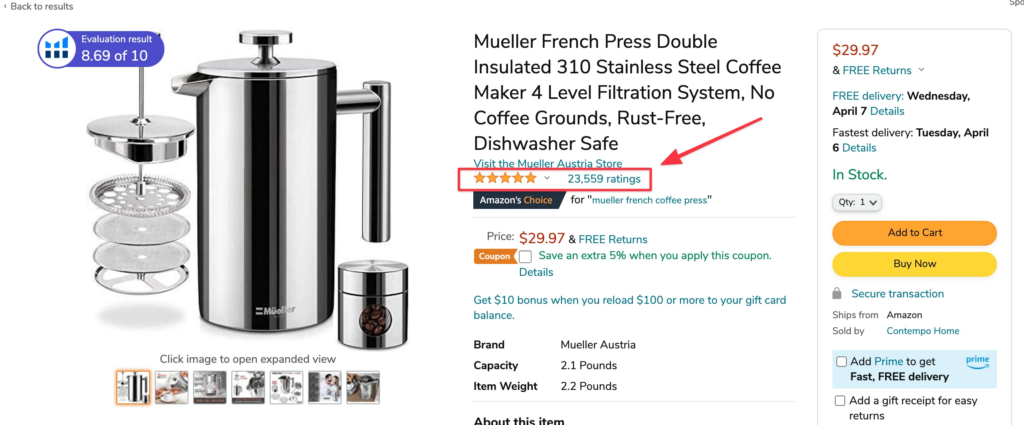
As you can see, 23,559 Amazon buyers have taken the time to leave a review and the overall score is almost five stars. Let’s see what customers like about the product.
To do that, I’m going to open the free Helium 10 Chrome extension and select the Review Insights tab.
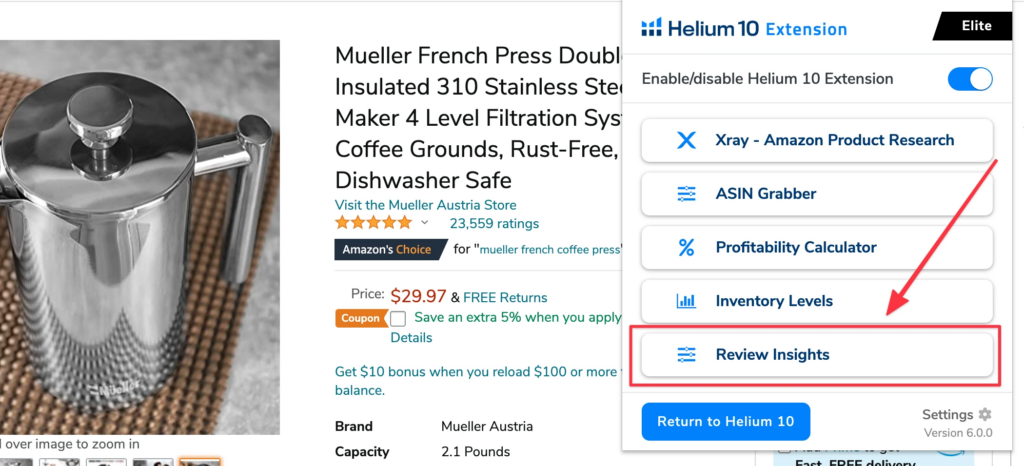
After pressing the Review Insights tab, you have the opportunity to select the search parameters. I’ve elected to search for five star reviews over a two month period.
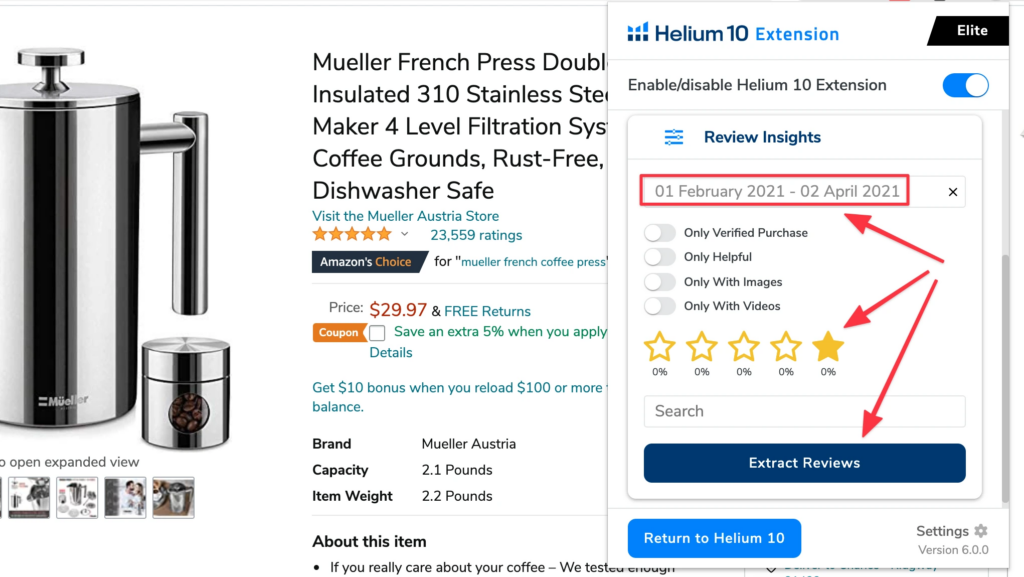
Let’s see why the buyers gave this product five stars.
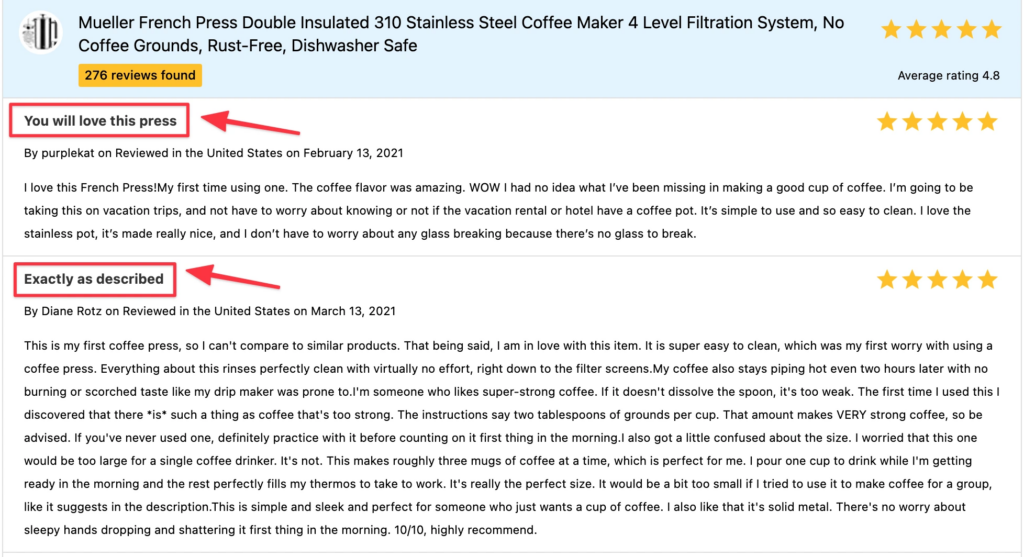
As you can see, 276 buyers found something to love about this product, but let’s look closer.

And let’s look at this one:

I’m cheating a little bit because I know what I like about this style of French Press, but it seems I’m not alone. Buyers love the fact that because of the double wall, stainless steel construction, the coffee stays hot.
When I look at the Analysis tab, it will give me the key phrases that show up most often in the reviews. It’s clear from the Amazon review analysis that buyers like their coffee hot.
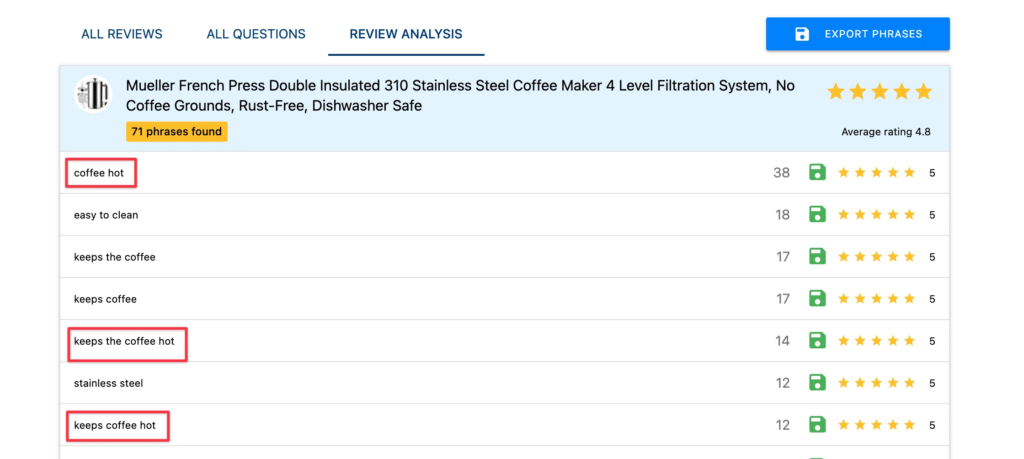
Now, let’s see what they don’t like. I’m just going to do the opposite and only choose one and two star ratings then press Extract Reviews.
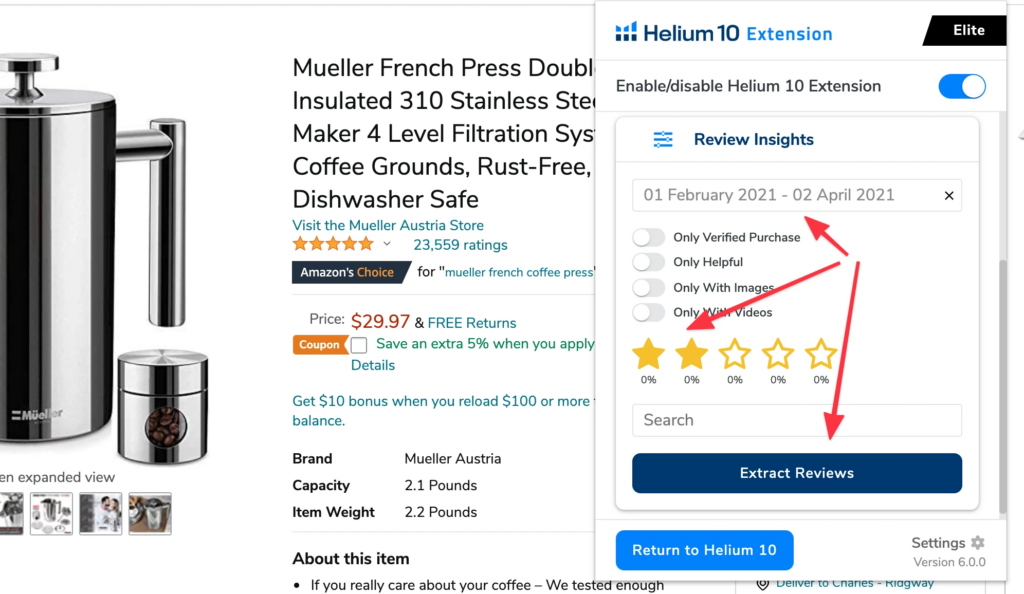
When I look at the small number of negative reviews, it’s hard for me to view these as design issues. Instead, I think it shows evidence of either manufacturing or quality control problems.
It looks like that if the plunger doesn’t break, buyers are happy.
If I’m considering selling a product like this to compete against other Amazon sellers, this is one battle I’m going to pass up. Hoping that there are enough problems with the plunger that help me to make headway with my own product seems like a sucker’s bet.
If I don’t have a way to manufacture this product for less money at the same level of quality, this is one product niche I’m going to avoid as a seller on Amazon.
Even Though It’s Data Science, There Are Always Surprises
When you’re doing this kind of data research, you don’t really know what you’re going to find or how you might ultimately use the information.
Sometimes the data you find has less to do with the product itself, than with the way that it’s packaged.
This next product we’ll look at is a good example of that.
Let’s look at this dog bowl sold on Amazon.
Overall, it has a four-and-a-half star rating and 1,456 buyers have taken the time to write a review.
Here’s what the buyers who gave it a five-star review had to say.
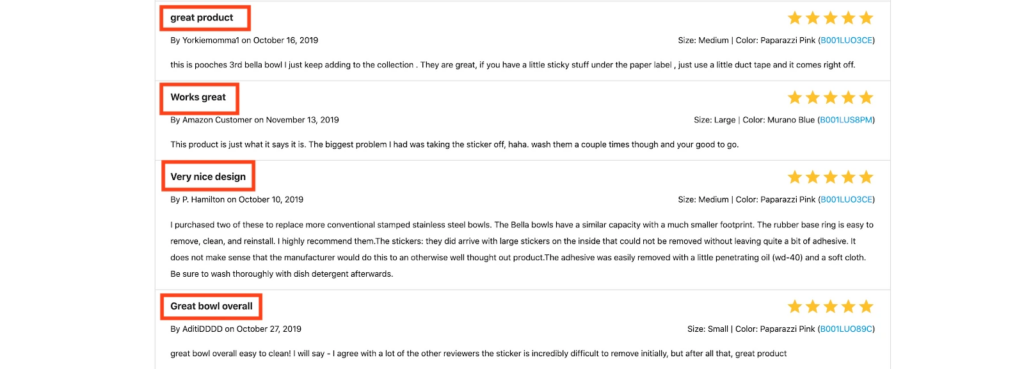
When we look at what the buyers had to say who gave it one, two, or three stars, it’s clear that there’s a problem that really doesn’t have anything to do with the product itself.
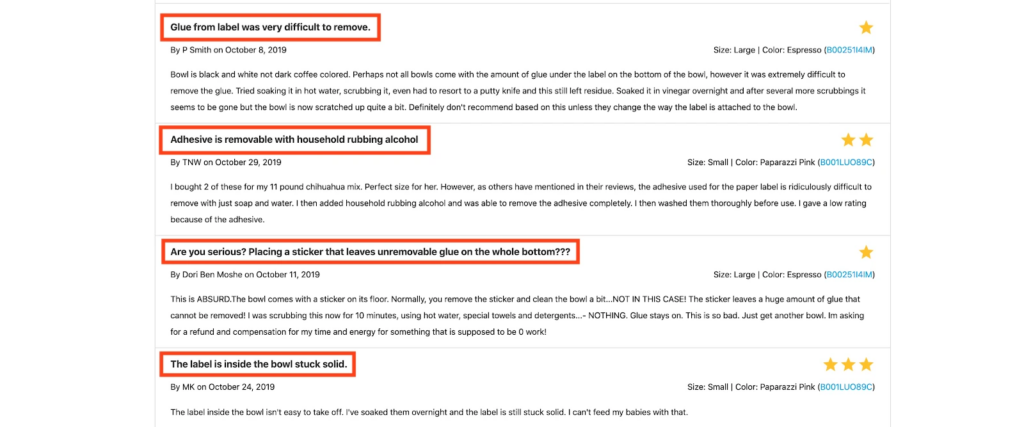
I can almost guarantee you that whoever is selling this bowl didn’t spend much time thinking about how and where the sticker was going to be placed on their product.
If they’re paying attention to their buyer reviews, now they are aware of it and are working hard to change the way that the sticker is affixed to the bowl.
One thing is certain, when it comes to e-commerce and selling on Amazon, more information is always better. That’s particularly the case when the information is coming from Helium 10, the industry leader in Amazon selling software.
Make sure that you keep the guessing and surprises to a minimum with Review Insights and the rest of Helium 10’s all-in-one tool suite, like their free Amazon keyword research tool!
That way you’ll know what your competitors are up to.
More importantly, you’ll have a clear understanding of what matters so much to the customers in your selling niche that they’re willing to take time out of their busy day to write a letter about it.
How cool is that?
Frequently Asked Questions
Achieve More Results in Less Time
Accelerate the Growth of Your Business, Brand or Agency
Maximize your results and drive success faster with Helium 10’s full suite of Amazon and Walmart solutions.

